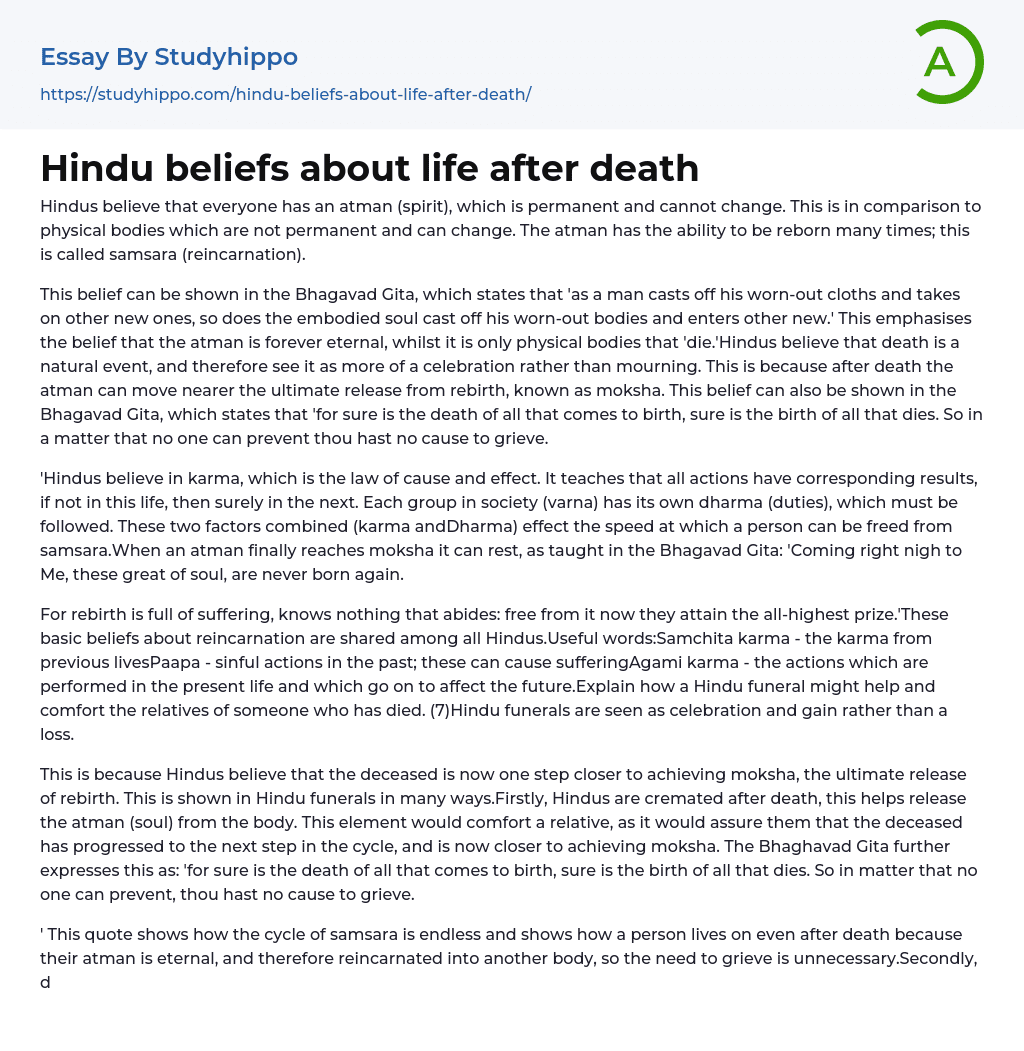Hindus believe that everyone has an atman (spirit), which is permanent and cannot change. This is in comparison to physical bodies which are not permanent and can change. The atman has the ability to be reborn many times; this is called samsara (reincarnation).
This belief can be shown in the Bhagavad Gita, which states that 'as a man casts off his worn-out cloths and takes on other new ones, so does the embodied soul cast off his worn-out bodies and enters other new.' This emphasises the belief that the atman is forever eternal, whilst it is only physical bodies that 'die.'Hindus believe that death is a natural event, and therefore see it as more of a celebration rather than mourning. This is because after death the atman can move nearer the ultimate release fro
...m rebirth, known as moksha. This belief can also be shown in the Bhagavad Gita, which states that 'for sure is the death of all that comes to birth, sure is the birth of all that dies. So in a matter that no one can prevent thou hast no cause to grieve.
'Hindus believe in karma, which is the law of cause and effect. It teaches that all actions have corresponding results, if not in this life, then surely in the next. Each group in society (varna) has its own dharma (duties), which must be followed. These two factors combined (karma andDharma) effect the speed at which a person can be freed from samsara.When an atman finally reaches moksha it can rest, as taught in the Bhagavad Gita: 'Coming right nigh to Me, these great of soul, are never born again.
For rebirt
is full of suffering, knows nothing that abides: free from it now they attain the all-highest prize.'These basic beliefs about reincarnation are shared among all Hindus.Useful words:Samchita karma - the karma from previous livesPaapa - sinful actions in the past; these can cause sufferingAgami karma - the actions which are performed in the present life and which go on to affect the future.Explain how a Hindu funeral might help and comfort the relatives of someone who has died. (7)Hindu funerals are seen as celebration and gain rather than a loss.
This is because Hindus believe that the deceased is now one step closer to achieving moksha, the ultimate release of rebirth. This is shown in Hindu funerals in many ways.Firstly, Hindus are cremated after death, this helps release the atman (soul) from the body. This element would comfort a relative, as it would assure them that the deceased has progressed to the next step in the cycle, and is now closer to achieving moksha. The Bhaghavad Gita further expresses this as: 'for sure is the death of all that comes to birth, sure is the birth of all that dies. So in matter that no one can prevent, thou hast no cause to grieve.
' This quote shows how the cycle of samsara is endless and shows how a person lives on even after death because their atman is eternal, and therefore reincarnated into another body, so the need to grieve is unnecessary.Secondly, during the funeral a candle is lit at the head of the deceased. Light is an important part of the Hindu faith, as shown with the celebration of Diwali (the festival of lights).
This celebrates good over evil, light over darkness, and knowledge over ignorance.
This is therefore represented by the candle and gives the relative a sense of hope that their loved one will go on to a better life.Thirdly, if possible the relatives of the deceased spread the ashes of the body into the river Ganges. The river Ganges is very holy to Hindus as ancient scriptures state that the water of Ganges carries the blessings of Lord Vishnu's feet. This action would help comfort a Hindu relative because it ensures them that an act they have done, will benefit and reward the deceased, making them apart of the cycle of samsara. This is because Hindus believe that the river Ganges can cleanse a person's soul of all past sins.
However, the funeral processes may differ among castes. This is because Brahmins (highest) are very religious and obey the Vedas in great detail. Their beliefs are fundamental on the Holy Scriptures. Whereas, the Chandalas views may differ because they are of a lower caste and are thought to be unclean and impure. Therefore they did not study the Vedas as they were seen to be above them. The religion that the Chandalas believe is esoteric, therefore it is complicated to they even believe in the basic beliefs in afterlife
- Mahayana essays
- Age Of Enlightenment essays
- Ethos essays
- Time essays
- Acceptance essays
- Meaning Of Life essays
- Reality essays
- Natural Law essays
- Political Philosophy essays
- Utilitarianism essays
- Existence essays
- Free Will essays
- Good And Evil essays
- Confucianism essays
- Relativism essays
- Conscience essays
- Environmentalism essays
- Empiricism essays
- Epistemology essays
- Ethics essays
- Existentialism essays
- Human Nature essays
- Individualism essays
- Metaphysics essays
- Philosophy Of Life essays
- Transcendentalism essays
- Truth essays
- Destiny essays
- Determinism essays
- Fate essays
- Functionalism essays
- Philosophers essays
- Pragmatism essays
- Future essays
- Child Observation essays
- Critical Reflection essays
- Teaching Philosophy essays
- Personal Philosophy essays
- Action Speak Louder Than Words essays
- Can Money Buy Happiness essays
- Values of Life essays
- Ethical dilemma essays
- Normative Ethics essays
- Virtue Ethics essays
- Belief essays
- Deontology essays
- Moral essays
- Virtue essays
- Work Ethic essays
- Henry David Thoreau essays




